
Alejandra Luna, left, and her daughter.
Alejandra Luna remembers the moment in 2019 when she lost her sight completely due to diabetes.
A few days prior, she started feeling more tired than usual, she was not hungry and her vision was blurry.
One night, while sleeping, she felt something pop next to her eye. She screamed due to the intense pain. Her eyes started filling with blood, and that was the last time she was able to see. She was 28 years old.
Eventually, she was told she had kidney failure, and one of the side effects was either loss of vision or amputation of limbs.
Luna was born diabetic but she never had an episode as a child, therefore she wasn’t taking any medication. At the age of 17, she started feeling sick, and after going through several tests, she was diagnosed with Type 1 Diabetes, which usually develops in children and young adults.
Type 1 Diabetes causes the pancreas to create very little to no insulin, which helps blood sugar enter the body's cells to use as energy, explains the Centers for Disease Control and Prevention (CDC). This type is less common, with only 5-10% of people developing it. No one knows how to prevent it; once symptoms appear, they can be severe. However, if diagnosed on time, it can be managed successfully by following doctor’s recommendations.
Mental and emotional toll
The diagnosis of Alejandra's blindness was devastating. She had to put her education on hold at East Los Angeles Community College and deal with a new plan to take care of her daughter, who was eight at the time.
“When my journey for dialysis started I was getting really bad symptoms. I was collapsing. I was getting a fever. I ended up in the hospital, back and forth,” she recalled.
While Luna was passing through her life experience, her mother was, too. She had been diagnosed with kidney failure, had lost sight in one eye and was also on dialysis.

Alejandra was in shock because she and her mother were facing the same illness. At first, Alejandra thought she could recuperate her sight if she followed the doctor’s recommendations. However, this was impossible because she had retina detachment. She said she felt her body go through a shock because she had to face up to the reality that she had just lost one of her senses permanently.
“You just feel so small, and the world automatically feels so big, getting around, bumping into everything, learning how to walk again, because I would want to walk normally. I wanted to run but just couldn’t,” she recalled.
She started learning to walk again and said her spirituality and belief in God helped her move forward, despite the obstacles.
Therapy
As Alejandra was adapting to her new life as a blind person, she didn’t realize she was immersed in survival mode rather than living her life.
“I tend to be quiet and put everything inside because I'm still a mom. I still need to take care of my daughter. I still need to provide a home. I still need money,” she said.
Her life became hectic because she could not see anything, not even shadows. She said her brain was confusing her at times. For example, if she woke up in the middle of the night, she had no sense of time until she checked because everything was dark regardless of whether it was night or day.
“And you are still going through anxiety because you lose your independence. It’s almost like being a five-year-old. I can't cook, can't clean, I can’t make a phone call, I need assistance to shower,” she said.
She started therapy with AltaMed, and that’s when she was able to face the reality of dialysis, treatment, surgeries and her survival mode. Luna found this very helpful as she could vent and talk about what was hurting her physically, mentally and emotionally.
Vision loss has been linked to loneliness, social isolation and feelings of worry, anxiety and fear, according to the CDC.
Frances Chinchilla, therapist and manager of Behavioral Health Services at AltaMed, said when she meets patients with any type of loss of previous level of functioning, such as sight, she approaches it from a grief side because they are grieving their old self and ability to navigate the world the way that they used to.
“So there is a period of shock, anger. There is the stage of negotiation, thinking about whether if I would have done this way if I would have cared for myself that way, maybe this wouldn't have happened,” Chinchilla explained. “And eventually, the hope and the goal is that we can get to a place of business, and we can move forward and embrace the new life.”
Chinchilla said it is vital to connect with a mental health provider to confront these types of situations.
“What these patients tell me is that they don't want to burden their family with their problems,” said Chinchilla.
She said patients told her there is frustration when talking to family members because they don't feel they are being heard. Therefore, they keep things to themselves, but eventually, symptoms of depression and anxiety appear.
“So therapy definitely helps a lot, but also knowing that you are not the only person facing these challenges and difficulties can really help patients start to feel understood, and they can learn a lot from each other as well, and learn ways to sort of manage and move forward from others who are also struggling with similar situations,” she said.
More than five years have passed since Luna lost her sight. Now she is waiting for a kidney and liver transplant, but despite the hardships, she keeps her head up.
With her experience, she learned that suppressing emotions is not healthy, and it is important for anyone facing a difficult situation to talk about it.
“If you hold it in, your body is still going to release that. You'll start trembling, shaking, sweating, crying, and you’ll feel so out of control in your body,” she said. “Acknowledge your feelings, don’t hold anything back because you are not going crazy, and you will get help.”
People interested in therapy with AltaMed can visit the Behavioral Health Services website athttps://www.altamed.org/behavioral-health-services or call (855) 425-1777.

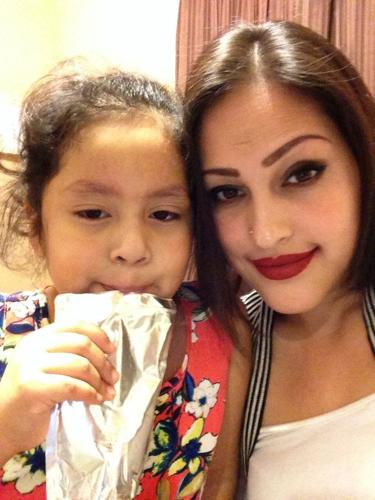


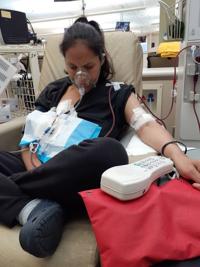

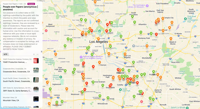

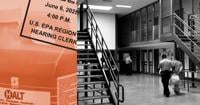

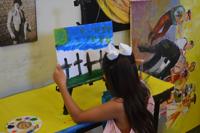
(0) comments
Welcome to the discussion.
Log In
Keep it Clean. Please avoid obscene, vulgar, lewd, racist or sexually-oriented language.
PLEASE TURN OFF YOUR CAPS LOCK.
Don't Threaten. Threats of harming another person will not be tolerated.
Be Truthful. Don't knowingly lie about anyone or anything.
Be Nice. No racism, sexism or any sort of -ism that is degrading to another person.
Be Proactive. Use the 'Report' link on each comment to let us know of abusive posts.
Share with Us. We'd love to hear eyewitness accounts, the history behind an article.